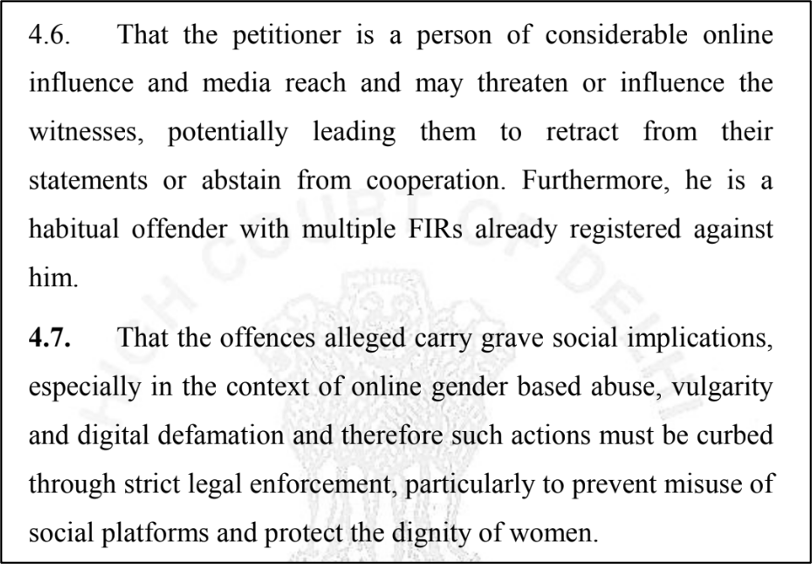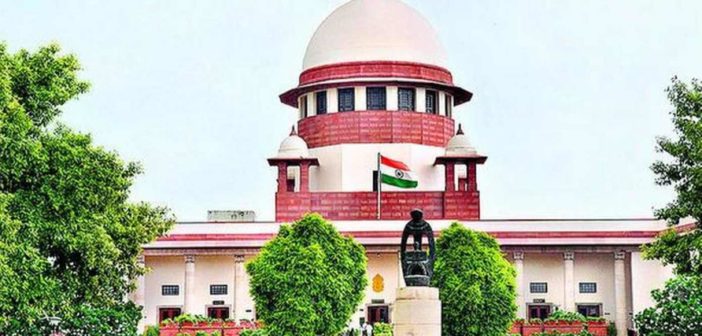In this edition of the court judgments review, we look at the Supreme Court’s observation that sex education should begin at a younger age and not from class IX onwards, the Bombay High Court’s ruling that even fundamental rights are subject to reasonable restrictions and citizens cannot freely visit public offices, the Orissa High Court’s decision holding Railways liable once a passenger’s bona fide status and an “untoward incident” are established, the Madras High Court’s observation that moral policing infringes on women’s constitutional right to dignity and life under Article 21, among others.
SC: Sex education should be provided to children from a younger age and not class IX onwards
The case Juvenile X vs. State of Uttar Pradesh involves a 15-year-old boy accused of offences under Sections 376 and 506 of the Indian Penal Code and Section 6 of the Protection of Children from Sexual Offences Act, 2012. The High Court denied him bail, leading him to appeal to the Supreme Court.
The appellant’s contention was that he should be granted bail, given his status as a juvenile. The Supreme Court, in an earlier order on 10 September 2025, had already directed his release on bail, with conditions to be set by the Juvenile Justice Board. The Court also asked the State of Uttar Pradesh to submit an affidavit on how sex education is provided in higher secondary schools.
The Court observed that while the State’s affidavit detailed the curriculum for classes IX to XII, sex education should begin at a younger age. The Court noted that authorities should take corrective measures to inform children about changes after puberty and related precautions.
The Supreme Court allowed the appeal and set aside the High Court’s order. The bail granted to the appellant was made absolute and will continue until the criminal case is decided. The Court clarified that its observations were only for the purpose of granting bail and not on the merits of the case.
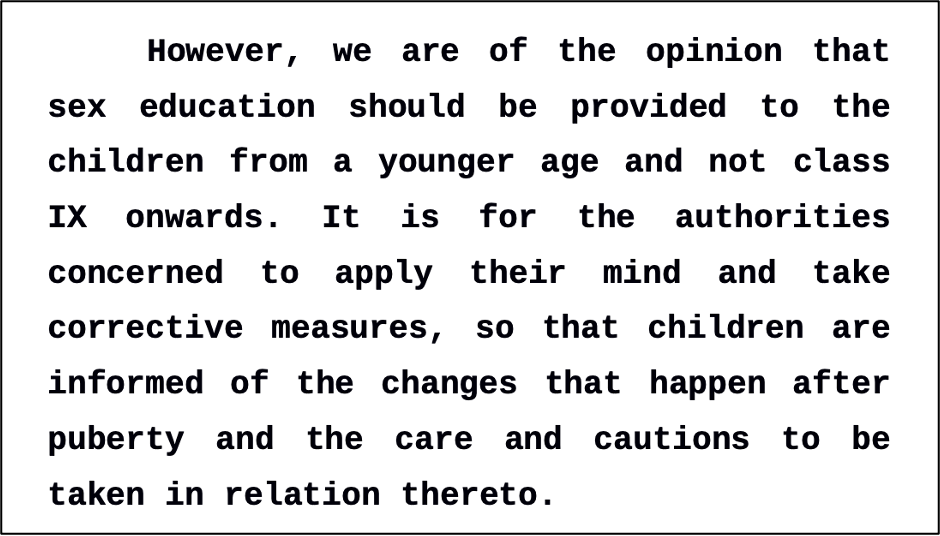
Bombay HC: Even fundamental rights are subject to reasonable restrictions and a citizen cannot have a free hand to visit the public offices
The petitioner in the case, Kishor Jairam Chakole vs. The Western Coalfields Ltd (WCL) and others, is a former employee whose services were terminated in 2004. He is a social activist who used to file complaints on behalf of employees and others with and against WCL officials. In 2024, WCL issued an order declaring him a “persona-non-grata” (an unwelcome person) and banned him from entering all their premises for three years. This was not the first time such an order was issued against him.
The petitioner contended that the WCL’s order was illegal. He argued that he visited their offices to help redress the grievances of others. The respondents (WCL) argued that the petitioner’s complaints were baseless and that his visits were an intentional act to malign the image of top officials. They claimed his unauthorised visits during working hours affected the smooth functioning of their public office and posed a security threat.
The court observed that since the petitioner’s employment was terminated in 2004, he had no absolute right to access the office. The court noted that his conduct and intention to visit the office were not genuine and were aimed at obstructing its smooth functioning. The court referenced a similar case, which stated that no individual has a fundamental right to harass public officers by repeatedly filing complaints. While citizens have the right to file complaints, filing frivolous and repeated ones burdens public officials. The court emphasised that even fundamental rights are subject to reasonable restrictions and that a citizen cannot have a “free hand to visit the public offices which would certainly affect the public administration”.
The High Court dismissed the writ petition, concluding that the petitioner did not make a valid case. The court discharged the rule, thereby upholding WCL’s decision to declare the petitioner as “persona-non-grata”.
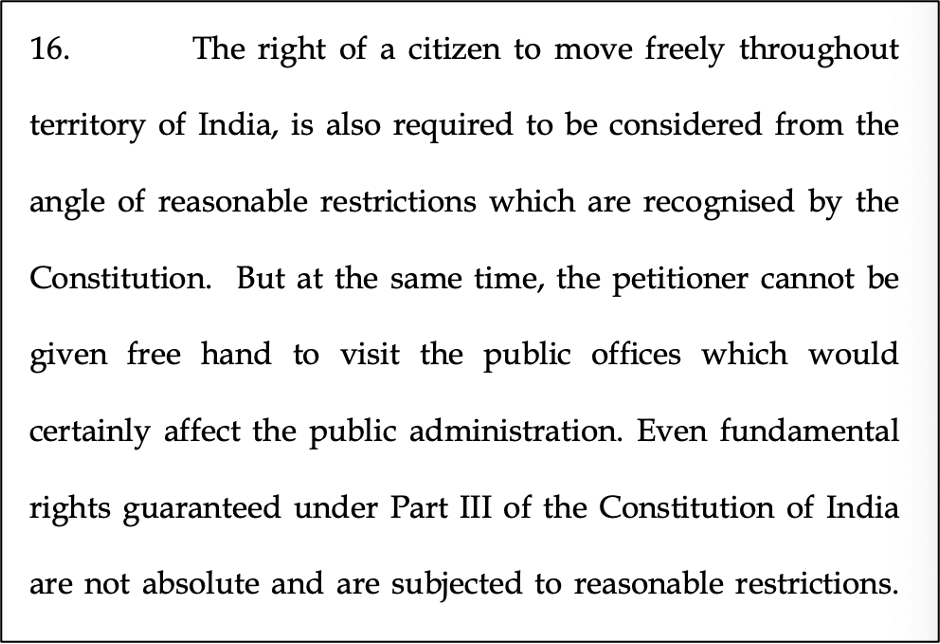
Orissa HC: Railways is liable once death in “untoward incident” and passenger’s bonafide status are established
The case is an appeal by Santosh Ku. Sahoo vs. Union of India. It challenges the Railway Claims Tribunal’s judgment that dismissed a claim for compensation. The claim arose from the death of Krushna Chandra Sahoo, who was allegedly a passenger on the Bisakha Express in January 2017. The appellant stated that due to overcrowding and a sudden jerk, the deceased fell from the train and died on the spot. The Tribunal had ruled that the deceased was not a “bona fide passenger”, and the incident was not an “untoward incident” under the Railways Act.
The appellant contended that the Tribunal’s findings were wrong and that police reports, inquest proceedings, and a post-mortem report all confirmed that the death was caused by an accidental fall from the train. The appellant also asserted that a valid ticket was found, proving the deceased was a bona fide passenger. The respondent argued the death was suicidal, not an accident, and that the deceased was not a bona fide passenger.
The High Court observed that once a bona fide passenger dies in an “untoward incident,” the railway’s liability is absolute under Section 124A. The court found that the evidence, particularly the police records, supported the claim that the death was an accidental fall from the train. It also held that the deceased was a bona fide passenger, as the ticket was recorded in the inquest report.
The High Court of Orissa allowed the appeal, setting aside the Tribunal’s judgment. The court concluded that the deceased was a bona fide passenger and his death resulted from an “untoward incident”. The court awarded compensation of Rs. 8,00,000 with 6% annual interest. The railway was directed to deposit the amount within three months.
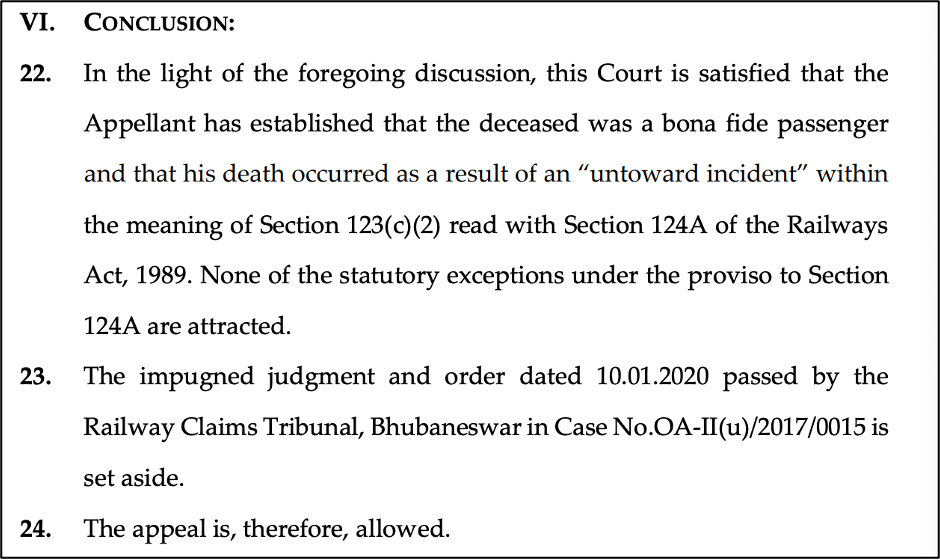
Madras HC: Moral policing women infringes upon the constitutional right to dignity and life under Article 21
The case, Navanitha vs. State of Tamil Nadu and another, is a criminal revision petition. The complainant filed the petition challenging the order of the Principal Sessions Judge, Theni. The judge had dismissed her petition to cancel the bail granted to the accused, A. Arun Kumar. The case originated from the suspicious death by suicide of the complainant’s daughter. The accused had allegedly engaged in “moral policing” by locking the deceased inside her house with another man, which led to rumours and public humiliation, causing her to take her own life.
The petitioner argued that granting early bail emboldens wrongdoers and that the accused’s actions directly led to the suicide. The accused’s counsel countered that bail should not be cancelled without a misuse of liberty or other “supervening circumstances”.
The High Court, while not cancelling the bail, strongly condemned “moral policing” as a “dangerous and regressive practice” that infringes upon the constitutional right to dignity and life under Article 21. It also noted that it contributes to social ostracisation and can push victims to suicide.
The court disposed of the petition but modified the bail conditions. The accused is now required to report to the police station twice daily for an additional one year, a condition meant to serve as a deterrent against further acts of moral policing.
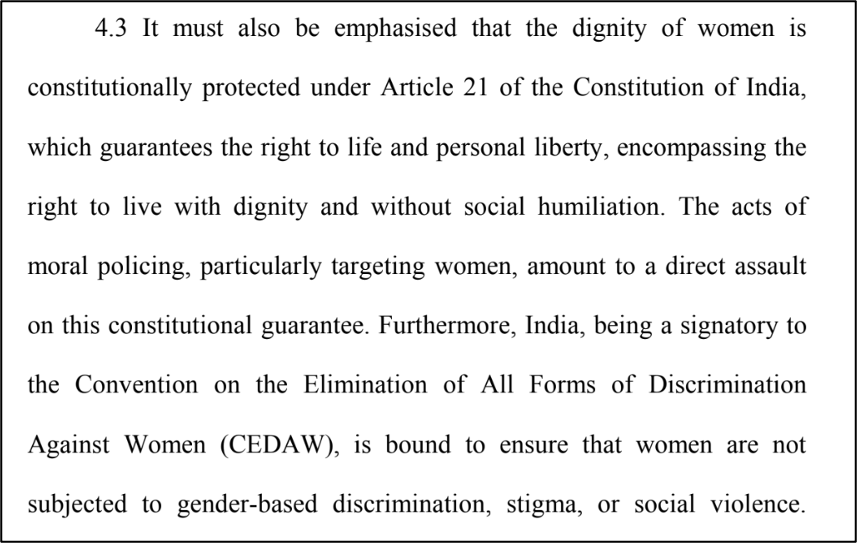
Delhi HC: When speech becomes insulting or humiliating, it clashes with a person’s right to dignity
This is a bail application filed by Ajaz Khan in the Delhi High Court seeking anticipatory bail. The case was registered at the Cyber Police Station under sections of the Bhartiya Nyaya Sanhita, 2023 and the Information Technology Act, 2000. The complainant, the mother of a well-known YouTuber, alleged that Ajaz Khan posted a reaction video containing sexually explicit remarks and threats against her and her daughter.
The petitioner, Ajaz Khan, argued that his video was in retaliation for a “derogatory” video made by the complainant’s son. He claimed he was unable to join the Delhi investigation due to his father’s medical emergency and a conflicting investigation in Mumbai. He also stated that his electronic devices had already been surrendered to the Mumbai police, making custodial interrogation unnecessary. The State opposed the bail, citing the petitioner’s deliberate evasion and non-cooperation with the investigation. The court observed that since the petitioner’s devices were already with the Mumbai police, the need for custodial interrogation was not necessary. The court concluded that the petitioner’s willingness to cooperate and the fact that his devices were already seized by police tilted the balance in his favour.
The court also observed that both the petitioner and the complainant’s son are social media influencers with a large following. It is noted that even if offensive content is deleted, it can reach a large audience and spark debates that adversely affect the victim. The court emphasised that individuals should use social media with great caution, as it can affect not only the person but also their fans. The court also highlighted that the constitutional right to freedom of ‘speech’ and ‘expression’ under Article 19 must be exercised within reasonable restrictions. When speech becomes insulting or humiliating, it clashes with a person’s right to dignity. The court granted anticipatory bail to Ajaz Khan based on several conditions.
